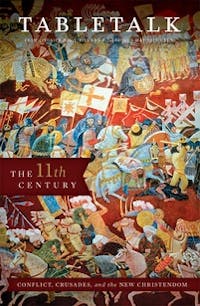
Request your free, three-month trial to Tabletalk magazine. You’ll receive the print issue monthly and gain immediate digital access to decades of archives. This trial is risk-free. No credit card required.
Try Tabletalk NowAlready receive Tabletalk magazine every month?
Verify your email address to gain unlimited access.
According to tradition, following the Norman Conquest of England in 1066, William the Conqueror, the Duke of Normandy, captured the English throne. As a result, Edgar the Atheling of England was unable to secure his rightful claim to the English crown and thus decided to return to Hungary, where he had lived previously with his exiled father. Joined by his sister, Margaret, Edward set sail from England for the continent. However, a storm forced their ship north to the rocky shores of Scotland. The king of Scotland, Malcolm III (d. 1093), extended hospitality to the English family and, in time, took Edward’s sister, Margaret, to be his wife. While Edgar continued his struggle for the English throne, Margaret dedicated herself to her husband and to the people of Scotland.
Queen Margaret of Scotland (c. 1045–1093) is barely mentioned in the annals of church history. Nevertheless, she was used of God mightily in eleventh-century Scotland. While the first crusade raged, while schism rent the church in the East, and while Anselm ministered in her homeland of England, Margaret was on her knees praying earnestly for her husband, the king of Scotland. Legend has it that as a new queen, Margaret would quietly slip out at night to a nearby cavern to pray for her husband’s conversion to Christ. At first, she was suspected of treason in plotting against her husband’s kingdom; however, she was vindicated in time as King Malcolm was converted and transformed, which, in turn, brought about transformation of his royal court and, ultimately, the nation of Scotland.
Margaret was a pious woman whom God set forth as an example of Christian character, holiness, and worship. The ladies of her court and many ladies of Scotland esteemed her highly and imitated her example of humility, prayer, and service. Margaret was a woman of the Word who immersed herself in the Gospel accounts of Jesus Christ. (Incidentally, her book of the Gospels remains one of England’s great treasures to this day, as it stands on display at Oxford’s Bodleian Library.) In addition to her own eight children, she adopted and raised nine orphans. She had a passion for the church, as she personally sponsored the construction and ministries of countless new churches and the revitalization of dilapidated churches. By her own consistent pattern of Lord’s Day worship and rest, the king and court eventually followed suit, and Sunday once again became a day of worship, rest, and service. Margaret was a reformer before the Reformation and an example to us all as she lived justly, loved kindness, and walked humbly before the face of God.
